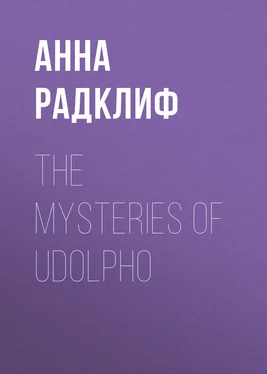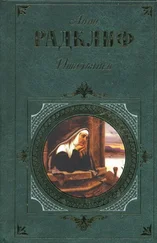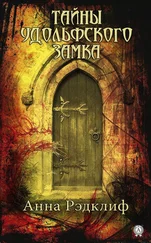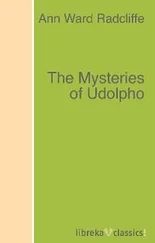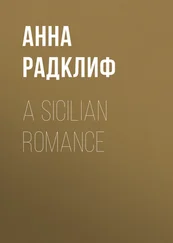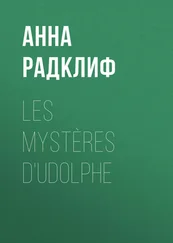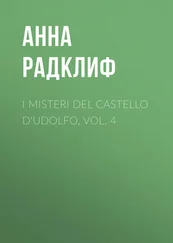Анна Радклиф - The Mysteries of Udolpho
Здесь есть возможность читать онлайн «Анна Радклиф - The Mysteries of Udolpho» — ознакомительный отрывок электронной книги совершенно бесплатно, а после прочтения отрывка купить полную версию. В некоторых случаях можно слушать аудио, скачать через торрент в формате fb2 и присутствует краткое содержание. Жанр: foreign_prose, literature_19, Ужасы и Мистика, foreign_fantasy, foreign_antique, на английском языке. Описание произведения, (предисловие) а так же отзывы посетителей доступны на портале библиотеки ЛибКат.
- Название:The Mysteries of Udolpho
- Автор:
- Жанр:
- Год:неизвестен
- ISBN:нет данных
- Рейтинг книги:5 / 5. Голосов: 1
-
Избранное:Добавить в избранное
- Отзывы:
-
Ваша оценка:
- 100
- 1
- 2
- 3
- 4
- 5
The Mysteries of Udolpho: краткое содержание, описание и аннотация
Предлагаем к чтению аннотацию, описание, краткое содержание или предисловие (зависит от того, что написал сам автор книги «The Mysteries of Udolpho»). Если вы не нашли необходимую информацию о книге — напишите в комментариях, мы постараемся отыскать её.
The Mysteries of Udolpho — читать онлайн ознакомительный отрывок
Ниже представлен текст книги, разбитый по страницам. Система сохранения места последней прочитанной страницы, позволяет с удобством читать онлайн бесплатно книгу «The Mysteries of Udolpho», без необходимости каждый раз заново искать на чём Вы остановились. Поставьте закладку, и сможете в любой момент перейти на страницу, на которой закончили чтение.
Интервал:
Закладка:
It was in one of these excursions to this spot, that she observed the following lines written with a pencil on a part of the wainscot:
Go, pencil! faithful to thy master's sighs!
Go—tell the Goddess of the fairy scene,
When next her light steps wind these wood-walks green,
Whence all his tears, his tender sorrows, rise;
Ah! paint her form, her soul-illumin'd eyes,
The sweet expression of her pensive face,
The light'ning smile, the animated grace—
The portrait well the lover's voice supplies;
Speaks all his heart must feel, his tongue would say:
Yet ah! not all his heart must sadly feel!
How oft the flow'ret's silken leaves conceal
The drug that steals the vital spark away!
And who that gazes on that angel-smile,
Would fear its charm, or think it could beguile!
These lines were not inscribed to any person; Emily therefore could not apply them to herself, though she was undoubtedly the nymph of these shades. Having glanced round the little circle of her acquaintance without being detained by a suspicion as to whom they could be addressed, she was compelled to rest in uncertainty; an uncertainty which would have been more painful to an idle mind than it was to hers. She had no leisure to suffer this circumstance, trifling at first, to swell into importance by frequent remembrance. The little vanity it had excited (for the incertitude which forbade her to presume upon having inspired the sonnet, forbade her also to disbelieve it) passed away, and the incident was dismissed from her thoughts amid her books, her studies, and the exercise of social charities.
Soon after this period, her anxiety was awakened by the indisposition of her father, who was attacked with a fever; which, though not thought to be of a dangerous kind, gave a severe shock to his constitution. Madame St. Aubert and Emily attended him with unremitting care; but his recovery was very slow, and, as he advanced towards health, Madame seemed to decline.
The first scene he visited, after he was well enough to take the air, was his favourite fishing-house. A basket of provisions was sent thither, with books, and Emily's lute; for fishing-tackle he had no use, for he never could find amusement in torturing or destroying.
After employing himself, for about an hour, in botanizing, dinner was served. It was a repast, to which gratitude, for being again permitted to visit this spot, gave sweetness; and family happiness once more smiled beneath these shades. Monsieur St. Aubert conversed with unusual cheerfulness; every object delighted his senses. The refreshing pleasure from the first view of nature, after the pain of illness, and the confinement of a sick-chamber, is above the conceptions, as well as the descriptions, of those in health. The green woods and pastures; the flowery turf; the blue concave of the heavens; the balmy air; the murmur of the limpid stream; and even the hum of every little insect of the shade, seem to revivify the soul, and make mere existence bliss.
Madame St. Aubert, reanimated by the cheerfulness and recovery of her husband, was no longer sensible of the indisposition which had lately oppressed her; and, as she sauntered along the wood-walks of this romantic glen, and conversed with him, and with her daughter, she often looked at them alternately with a degree of tenderness, that filled her eyes with tears. St. Aubert observed this more than once, and gently reproved her for the emotion; but she could only smile, clasp his hand, and that of Emily, and weep the more. He felt the tender enthusiasm stealing upon himself in a degree that became almost painful; his features assumed a serious air, and he could not forbear secretly sighing—'Perhaps I shall some time look back to these moments, as to the summit of my happiness, with hopeless regret. But let me not misuse them by useless anticipation; let me hope I shall not live to mourn the loss of those who are dearer to me than life.'
To relieve, or perhaps to indulge, the pensive temper of his mind, he bade Emily fetch the lute she knew how to touch with such sweet pathos. As she drew near the fishing-house, she was surprised to hear the tones of the instrument, which were awakened by the hand of taste, and uttered a plaintive air, whose exquisite melody engaged all her attention. She listened in profound silence, afraid to move from the spot, lest the sound of her steps should occasion her to lose a note of the music, or should disturb the musician. Every thing without the building was still, and no person appeared. She continued to listen, till timidity succeeded to surprise and delight; a timidity, increased by a remembrance of the pencilled lines she had formerly seen, and she hesitated whether to proceed, or to return.
While she paused, the music ceased; and, after a momentary hesitation, she re-collected courage to advance to the fishing-house, which she entered with faltering steps, and found unoccupied! Her lute lay on the table; every thing seemed undisturbed, and she began to believe it was another instrument she had heard, till she remembered, that, when she followed M. and Madame St. Aubert from this spot, her lute was left on a window seat. She felt alarmed, yet knew not wherefore; the melancholy gloom of evening, and the profound stillness of the place, interrupted only by the light trembling of leaves, heightened her fanciful apprehensions, and she was desirous of quitting the building, but perceived herself grow faint, and sat down. As she tried to recover herself, the pencilled lines on the wainscot met her eye; she started, as if she had seen a stranger; but, endeavouring to conquer the tremor of her spirits, rose, and went to the window. To the lines before noticed she now perceived that others were added, in which her name appeared.
Though no longer suffered to doubt that they were addressed to herself, she was as ignorant, as before, by whom they could be written. While she mused, she thought she heard the sound of a step without the building, and again alarmed, she caught up her lute, and hurried away. Monsieur and Madame St. Aubert she found in a little path that wound along the sides of the glen.
Having reached a green summit, shadowed by palm-trees, and overlooking the vallies and plains of Gascony, they seated themselves on the turf; and while their eyes wandered over the glorious scene, and they inhaled the sweet breath of flowers and herbs that enriched the grass, Emily played and sung several of their favourite airs, with the delicacy of expression in which she so much excelled.
Music and conversation detained them in this enchanting spot, till the sun's last light slept upon the plains; till the white sails that glided beneath the mountains, where the Garonne wandered, became dim, and the gloom of evening stole over the landscape. It was a melancholy but not unpleasing gloom. St. Aubert and his family rose, and left the place with regret; alas! Madame St. Aubert knew not that she left it for ever.
When they reached the fishing-house she missed her bracelet, and recollected that she had taken it from her arm after dinner, and had left it on the table when she went to walk. After a long search, in which Emily was very active, she was compelled to resign herself to the loss of it. What made this bracelet valuable to her was a miniature of her daughter to which it was attached, esteemed a striking resemblance, and which had been painted only a few months before. When Emily was convinced that the bracelet was really gone, she blushed, and became thoughtful. That some stranger had been in the fishing-house, during her absence, her lute, and the additional lines of a pencil, had already informed her: from the purport of these lines it was not unreasonable to believe, that the poet, the musician, and the thief were the same person. But though the music she had heard, the written lines she had seen, and the disappearance of the picture, formed a combination of circumstances very remarkable, she was irresistibly restrained from mentioning them; secretly determining, however, never again to visit the fishing-house without Monsieur or Madame St. Aubert.
Читать дальшеИнтервал:
Закладка:
Похожие книги на «The Mysteries of Udolpho»
Представляем Вашему вниманию похожие книги на «The Mysteries of Udolpho» списком для выбора. Мы отобрали схожую по названию и смыслу литературу в надежде предоставить читателям больше вариантов отыскать новые, интересные, ещё непрочитанные произведения.
Обсуждение, отзывы о книге «The Mysteries of Udolpho» и просто собственные мнения читателей. Оставьте ваши комментарии, напишите, что Вы думаете о произведении, его смысле или главных героях. Укажите что конкретно понравилось, а что нет, и почему Вы так считаете.
